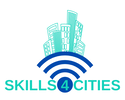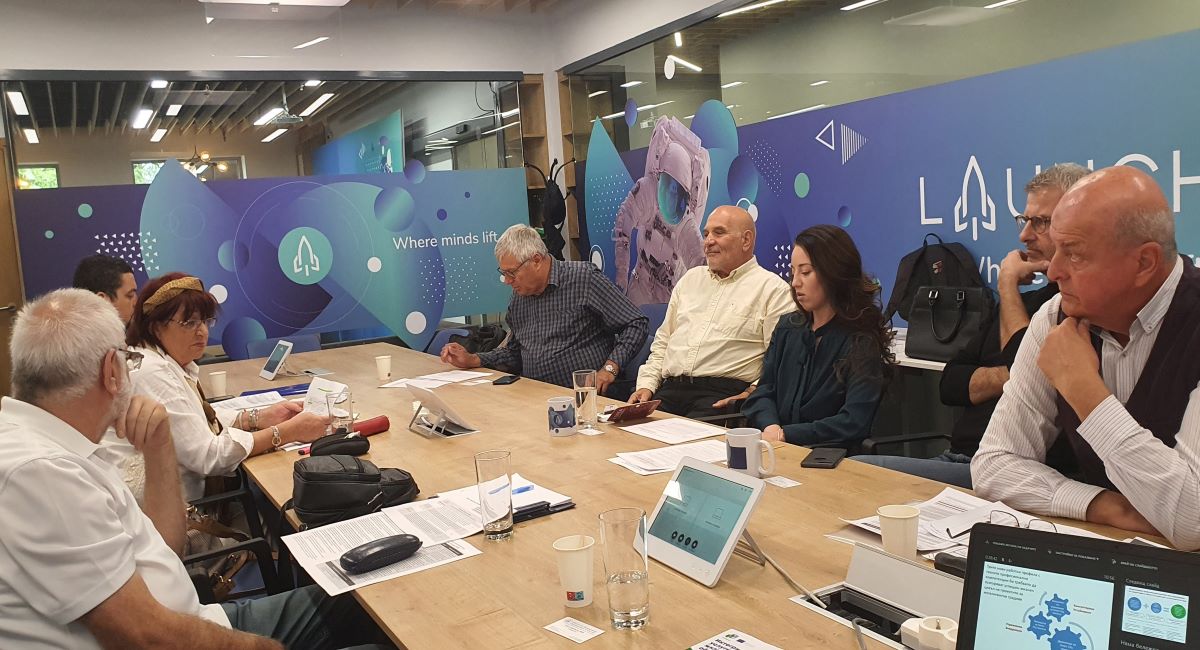|
On 21.09.2022, at the Launchее Center, we held a discussion meeting in connection with the implementation of the Smart Skills for Smarter Cities (Skills4Cities) project, Erasmus+ No 2020-1-BG01-KA202-079071, which has been implemented since 2020 by a consortium with a leading partner Cluster Sofia Knowledge City. We thank the 14 experts from universities, professional organisations and businesses who participated in the discussion. Special admiration to Innovative Sofia, that joined the discussion with their representative on this topic, to which they have a special concern and which is directly related to their activities. Our aim was to obtain expert opinion and feedback on the proposed competences and qualifications required to fulfil three closely related (as a qualification) job roles that we believe can ensure the success of smart city projects, namely Smart Cities Project Developer, Manager and Management Consultant. Participants in this focus group were asked:
In the context of the project, the discussion was directly related to the needs of cities for experts with new and/or upgraded competences, knowledge, skills and abilities, with which they can effectively manage the digital transformation process. In summary, the result of this discussion is as follows:
As a result of the discussion, it was accepted that the proposed competency model and the EQF level for each competence for the three job roles are applicable and suitable for use, giving reason to consider that this stage of the project has been verified and its results can be used in the next phase related to the validation process. You can learn more about the project and its outputs here. Technology has a significant influence in the emergence of smart cities as a hot subject in contemporary urban life and new developments for the foreseeable future in terms of city design. Understanding the benefits and opportunities that various technologies may offer is crucial, since smart cities rely on technology to improve accessibility, infrastructure, sustainability, government services, for the lives of its citizens. Today, we would like to take a closer look at the various ways that Blockchain Technology might positively affect the growth, support the growth and presence of smart cities in a variety of ways. First and foremost, we need to understand what Blockchain is. Blockchain is a distributed ledger, which lets network participants share data in a trusted, transparent and tamper proof way and without the need of a third party acting as an authenticator. Data Exchange & Financial TransactionsArguably one of the “easiest” reasons for implementing Blockchain is to use it as an easy and secure way to exchange data and to facilitate safe, borderless financial transactions. This lets businesses become faster and more efficient in many day-to-day tasks, as the need for third party authentication is no longer needed. Moreover, financial transactions can be facilitated regardless of the time of day or currency one wants to transact in. With a blockchain based payment system, people are not dependent on the opening hours of banks and do not have to face currency conversion transactions. Improved MobilityWith activity on blockchains inherently being trackable, the transportation sector can hugely benefit from its implementation. One example can be creating a secure vehicle tracking system, where owners can act better and faster, in case their vehicle gets stolen. Further, building such a network, where vehicle data gets stored on the blockchain the sale and resale process of vehicles gets enhanced, as a record of all the information about a vehicle is safely stored and accessible on the Blockchain. For more info on an initiative, which is using blockchain technology to build an urban mobility alliance, check out https://bloxmove.com/. Further, https://dlt.mobi/, is developing the Web3 digital infrastructure for connected vehicle and IoT commerce, with the goal of making “transportation more efficient, equitable, decentralized, and sustainable, all while preserving the data privacy of users and providers alike”. Real Estate OwnershipBlockchain can provide a secure database with all the information about a property and its history in one place, and further ease up the buying and selling process through the use of smart contracts. All in all, smart city developers should seriously consider taking advantage and incorporating as many technologies as possible, when planning and establishing a smart city. References 1 https://www.forbes.com/sites/naveenjoshi/2022/04/07/6-ways-in-which-blockchain-makes-your-smart-city-even-smarter/ 2 https://www.c-sharpcorner.com/article/smart-city-and-blockchain-when-innovation-meets-technology/ 3 https://www2.deloitte.com/za/en/pages/financial-services/articles/blockchain-for-smart-cities-article-3-of-3.html 4 https://www.microsoft.com/en-us/industry/government/resources/smart-cities |
AuthorSkills4Cities Archives
February 2023
Categories
All
|
|
The Smart Skills for Smarter Cities [Skills4Cities] Project No. 2020-1-BG01-KA202-079071 has been co-funded by the Erasmus+ Programme of the European Union.
This website reflects the views only of the author, and the European Commission cannot be held responsible for any use which may be made of the information contained therein |
SKILLS4CITIES |
SUPPORT |
Copyright ®2021 SKILLS4CITIES. All rights reserved.



 RSS Feed
RSS Feed
